Why We Stay in Beirut
Despite the countless crises faced by people in Lebanon in the past few decades, many say they can't imagine living anywhere else.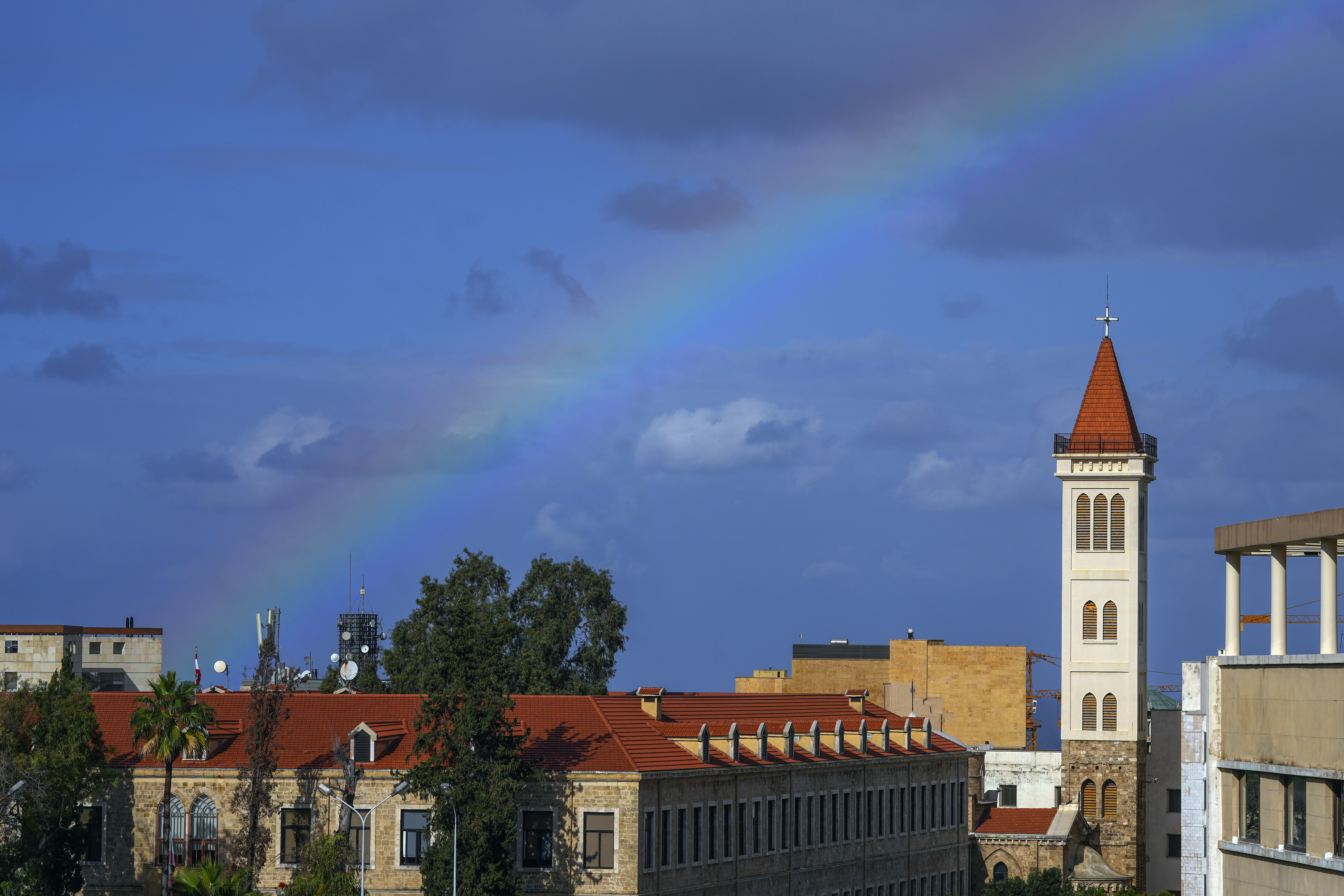 A rainbow appears over a church in downtown Beirut, Lebanon, Monday, Nov. 27, 2023. (AP Photo/Bilal Hussein)
A rainbow appears over a church in downtown Beirut, Lebanon, Monday, Nov. 27, 2023. (AP Photo/Bilal Hussein)
As we were all watching the havoc and devastation being wreaked on Gaza by Israeli warplanes, tanks and troops, and wondering how Palestinians would survive the onslaught to live another day, I asked myself how they managed to live through the conflagrations of 2009, 2014 and 2021. At the same time, a few hours to the north of Gaza, the residents of Beirut are hunkered down, observing the carnage and remembering everything they’ve lived through, including innumerable crises these past few years.
Beirut is a city of many endings and beginnings, where so many people have started over, again and again, or left and then returned. As we all watch the decimation of Gaza (thousands of buildings destroyed, including schools, hospitals and the Strip’s main library), and hear about the deaths of more than 15,000 civilians, predominantly children and women — including many families, and friends — one cannot help but also think of Beirut, whose residents have endured not only the civil war but one crisis after the other.
How do they manage, and why do they stay?
Many Lebanese have left the country over the years; in fact, there are more Lebanese living abroad than at home, as everyone knows. This is certainly true of Palestinians as well. But while we wait to see how Israel’s latest onslaught affects life for the people of Gaza, I asked four Beirutis why they stay, and how they manage, in spite of everything.
Amal Ghandour
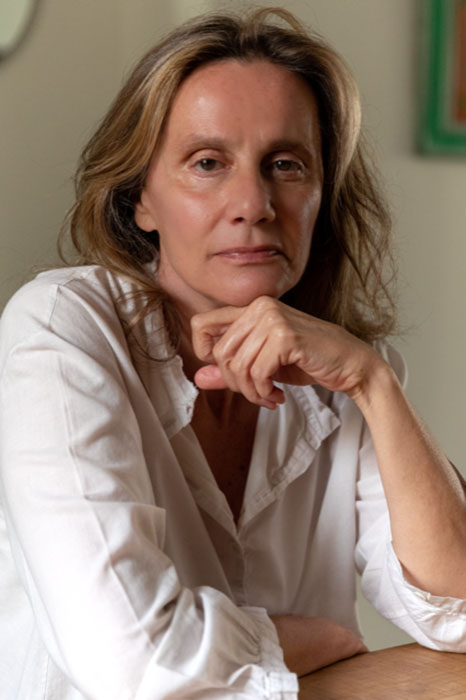
I have long battled with this question, Jordan. Some reasons are very obvious and, well, predictable, others are very complicated and elusive.
I do rather well inside my bubble. I’ve built quite a formidable one and it has almost everything I need for long stays: loved ones, a comfortable home, a nice neighborhood, all the freedom I need as a woman. And mine is a privileged life. To every state failure, I have a private solution; to every frustration, an escape. I have easy access to everything I need. There is little effort in Lebanon, and much effort everywhere else practically.
There are also the torments of this place which are the stuff of my thoughts and the material for my pen. I don’t find it interesting, I find it existential. The country withers, and withering countries have much to say. So, I listen.
I can and do imagine myself spending less time in Lebanon. Leaving even. In this, I follow the lead of those close to me. Because home for me is where they are. If more of them start to leave, I will do the same. If they determine there is nowhere else to go, and Beirut is good enough, it will be a while before I truly fade from the scene. But eventually, I suspect, there will be little trace of me here. And that, in so many ways, breaks my heart.
Amal, is living in Beirut often, or rarely stressful, and if so, what do you do to cope with the stress? Secondly, if you were to leave, where would you be likely to resettle?
More than stressful. It’s maddening.
In 30 years, I haven’t been able to build any immunity against the callousness of the place, the way in which every other person blithely violates basic rules of conduct. And then there is the omnipresence of a political-economic-sectarian elite whose grotesqueness is truly outlandish.
But again, the bubble helps. I don’t watch any local television, I know which articles to skip in al Akhbar, the only local newspaper I skim through, I stay away from circles and places that offend my sensibilities, I walk out of gatherings where conversation is very likely to offend me… My daily routine offers its own insulations. You learn how to protect yourself quickly enough. The kind of work I do helps as well. I don’t have to interact much with too many people, I don’t have to be on the road constantly, I don’t have to entertain people I don’t like…
Destinations! Athens is one possibility, Geneva is another. London, perhaps. I have a European passport, so I have options.
Joumana Haddad
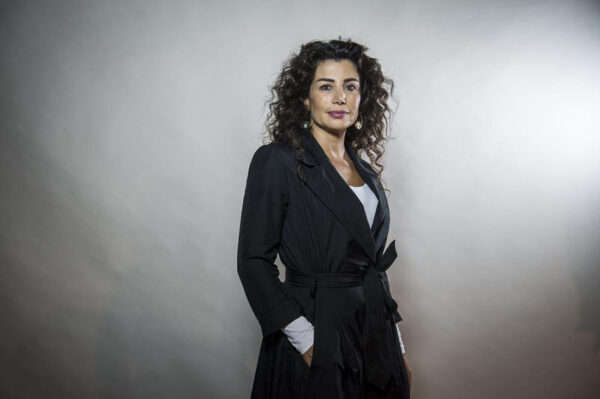
Why do I stay? For so many reasons:
1. Because I cannot “not stay.” What I’ve been through in this country has become such a huge part of who I am and what I stand for, that if I leave, I would lose myself. I would lose what makes me “me.” I’ve paid such a high price and invested so much time and energy and dreams and heartbreaks just by being born here, not to mention by living here and going through all that I went through and fighting all the personal and collective wars that I’ve fought, that leaving would equal failing myself and the choices that I’ve made. It would be an admission of defeat, and I will not be defeated.
What I’ve been through in this country has become such a huge part of who I am and what I stand for, that if I leave, I would lose myself.
2. Because I have become addicted to challenges and hardships. This is what Lebanon and this whole region does to you. Would I like to simply live instead of feeling that I am going to war every morning? Sure. But I will miss the adrenaline of having to resist and confront and overcome.
3. Because staying is a defiant, offensive stance, not just an innate attachment. It is a middle finger in the face of everything and everyone that keeps trying to push me away, dishearten me, scare me, murder me, frustrate me, and tell me that I should just abandon all hope and leave. Fuck them all, I am staying.
But how do you manage the many ordeals, from the port explosion to the banking crisis, for instance?
How do I do it? One way is not thinking about it. Just accepting it as a fait accompli. Another way is inventing hope from scratch every single morning. And my trips abroad help a lot. They give me oxygen.
Isn’t life stressful? How do you cope?
Of course life is stressful here (and that’s an understatement), but like I said before, when you’ve been raised and you’ve lived all your life under stress, it stops being an external factor, it becomes part of the system. It’s the enemy within, and you sleep and wake up with that enemy. You fight it with the help of family, friends, work, passions, love, laughter, nights out dancing, and sometimes a pill or two.
If you were to leave Beirut to go live abroad, where you would go?
I’m not sure where I’d be able to live. The closest I’ve been to feeling “home” abroad has always been Latin America. Mainly Colombia, but other parts as well. But that’s too far from home to be viable and bearable right now. So I’d rather not think about it.
Lina Mounzer
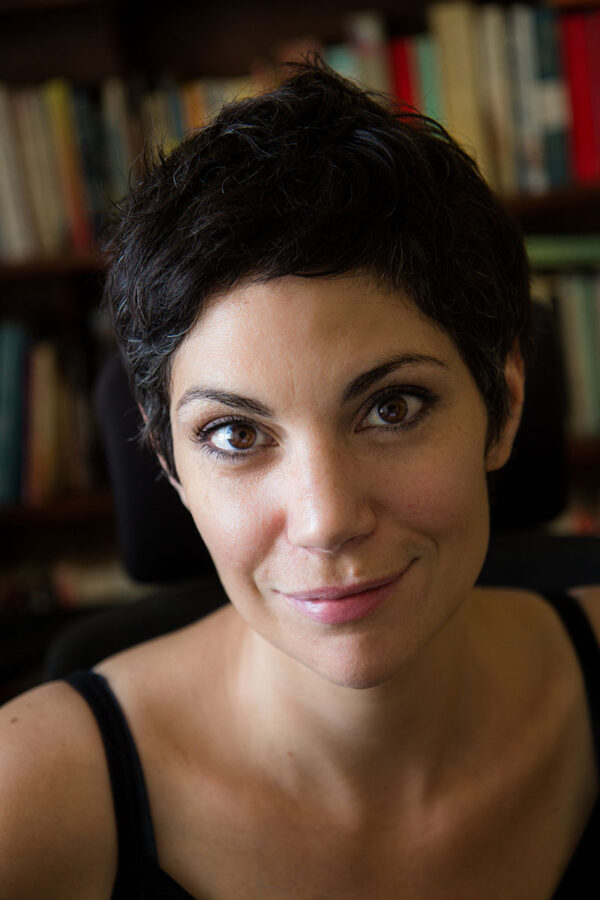
I guess the short answer to why I stay in Beirut is that it’s the place where I feel like I have to explain myself least. I’ve lived here nearly all my life, and so the city itself is just layers and layers of memory for me: this the street corner where I had a screaming argument with an ex, this was the apartment I lived in when I was finishing university, this is the bar where I spent the summer of 2013… And of course half these places are gone now, like there’s one parking lot where I always look up at the sky, about where a fifth-floor apartment would be, and imagine how I sat there on the balcony with dear friends before the building was demolished.
At the risk of pathologizing everything though, I do think that a lot of my love for this place is a kind of trauma response. I talk about it in the essay I shared with you, “The Janus-Faced City” — Beirut as a “wounded creature” was a mythology that loomed so large for me, and I think it became more intense when we moved to Canada when I was almost 11. I was really so extremely homesick, and because of the stress of the move and the isolation of the new place, Canada is also where it became clear to me that my parents’ marriage was less than ideal, and that my parents were also so ill-prepared for life in this new place. Everything felt forlorn and we felt lesser-than, and I’d never felt that way in Beirut.
So Beirut became the place of belonging and feeling right and Canada was the place of dislocation and upheaval. My family had financial troubles (as I wrote in “The Gamble”*) and things were really tense and awful at home. And so because of those financial issues, and because I was so homesick, it seemed like a perfect solution to everyone’s problems to send me back to Beirut to finish high school here and have my grandmother take total financial responsibility for me. My family over there would have one less “mouth to feed,” my grandmother would have company, and I would have my grandmother and Beirut. And really, it was so magical to be back: the postwar city was like a fairytale landscape, literally shifting beneath my feet. Around every corner was something new to be discovered.
Fundamentally I was a teenager coming of age in a lawless place with very little parental supervision to boot and so, again, being in Beirut coincided with some intense personal feelings and milestones whose passions all became projected onto the landscape of the city. In Canada I was a weirdo who’d lived through war, a kind of freak somehow; in Beirut I was like everyone else, and those reminiscences that set me aside as other in Canada (hiding in shelters, playing cards all night, being able to tell different artillery shell calibers apart by sound) became sources of camaraderie here because everyone had grown up in the same way and there was nothing weird about it.
I guess the short answer to why I stay in Beirut is that it’s the place where I feel like I have to explain myself least.
It had never occured to me to think of myself as “other” vis-a-vis the west until I actually went to the west and they made me feel that way, and I don’t think I’ve ever gotten over that. Looking back now as an adult, it’s very clear to me that in Canada I didn’t have the language to express who I was or where I’d come from and didn’t really know how to compartmentalize, or not, my experiences, and when I came back I didn’t need a new language because everyone spoke the one my heart spoke, if that makes sense.
And then I stayed here and stayed here and the longer I stayed, the more memories accumulated and the more the external landscape began to embody my emotional landscape and vice versa (like I love the weather here, the fall of light, the saltspray of the sea, the way the mountains smell in the early fall, the bursts of bougainvillea and hibiscus flowers and jasmine among the concrete buildings, and in the springtime the streets carpeted with lilac jacaranda blossoms…).
Can you imagine moving abroad, to a place where one doesn’t wake up every day to yet another crisis, that doesn’t put so much stress on the immune system?
I definitely have the pull to want to live somewhere that puts less stress on me, as you put it. In fact after the last three or four years, I felt really done with this place and the extreme levels of stress and uncertainty that characterize life here. But every time I go abroad I feel like there’s something not quite right. I think… in Beirut, to me, there are no illusions somehow. Life feels closer to the heart of things. There is very little that cushions you from the starkness of reality, the fact of everyone’s interconnectedness, that our fates all depend upon one another, that any happiness is bought at the expense of someone else but also that joy is a thing that blooms from face to face and that the way you treat people matters…
I don’t know if I’m explaining it correctly. Life is messy and painful here and that’s what life ought to feel like. What it seems to me that life ought to feel like. I love the fact of knowing one small place really really well. I imagine it’s like a long (healthy, loving) marriage, where you are continuously surprised by the other person and could never imagine leaving even if they do drive you crazy on occasion.
My mom on the other hand is like you — she says she’s never felt quite at home anywhere but Canada is the place that comes closest simply because it’s the place she’s lived longest in her life. She was born and raised in Cairo, then lived in Kuwait, then Beirut, then the USSR, then Saudi Arabia, then Beirut again, then Montreal. In all the places before she felt constrained in her womanness I think (well, I know). There was a sense of not really being free. And then in Montreal, especially after she became a widow, she gained a kind of freedom she’d never had or known before. And for me Beirut was the place I gained my freedom. So maybe that’s all it really is; the place somehow provides something for you, or coincidentally happens to be there while you yourself are naturally experiencing something intense and new and rare and all the feelings then get projected onto the place itself.
I don’t know, I love the mythology of Beirut, the attitude, the weather, the fact that people know how to pull through hard times. I love the food and sunshine and sea — and I love that I can say fuck Zionists here and have been able to say it forever without anyone misunderstanding me or me having to temper my opinions for western ears.
I often say that this is a place where your belonging is measured by your proximity to the site of a specific wound.
There’s a lot I hate about it too, and above all I hate that I can’t quit it. I feel like I would like to, love to, find somewhere else to live, somewhere that can feel like home and where I can feel more relaxed and less anxious and claustrophobic all the time. But where is that place?
Like now, for example, there’s a chance of war. And I have two equal feelings very strongly: I would love to be abroad and not be worrying about that. But also I would die if I were abroad and war broke out and I had to watch it from afar again, as in 2006, when I happened to be finishing up my Master’s degree in London right as the July war broke out.
I often say that this is a place where your belonging is measured by your proximity to the site of a specific wound. I think it’s very unhealthy but I don’t know of another way to be. The upside is I do have a sense of belonging that not many people have. The downside is it’s a belonging that comes at a very high cost.
Lina, the state you’re living in has been described by one writer we published as being in a state of “permanent temporariness.” (When I was younger, I actually loved living that way; by one calculation, I had moved houses/flats 25 times by my early 30s. It was a bit much!) I’m imagining now all those photos/artworks that you’re meaning to put up, all the things that you want to do but aren’t doing because you think you might have to pick up and leave. What a predicament. I wish I knew the answer.
Mohamed Al Mufti
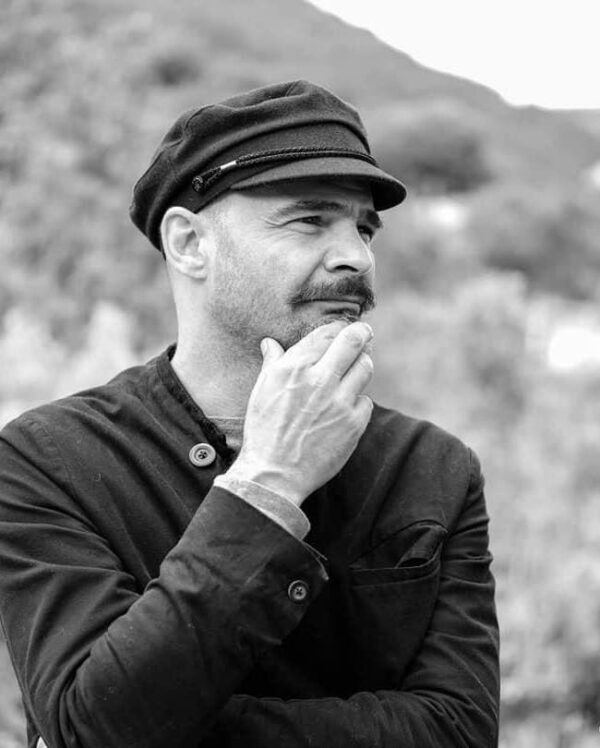
Mohamed, you’re an architect and an artist and you’ve lived in several other places; why stay in Beirut?
My first decade was in Kuwait. Then I went to Syria, then France for like 15 years. Then back to Syria again until 2012. Then I came to live here.
You’ve been in Beirut now for over 10 years, and you’re not planning on leaving anytime soon, are you?
One day, if it really collapses here, I would go back to Syria. But I don’t think this is going to happen anytime soon.
I’m just trying to understand how one copes with situations where for instance you don’t have electricity 24/7. You have banks that are not always willing to give you your own money. You’ve had a deepening economic crisis, a garbage crisis. You had the port explosion. How do you jump through all those hoops, and still not get completely stressed out? That’s what I don’t understand.
No, actually we are stressed. You have all the ingredients to be totally depressed and stressed, and have stomach aches and headaches and everything. But I don’t know. I think there’s no rational answer for this. It’s more a feeling of belonging to this region, feeling that whatever happens to my compatriots, whether in Syria or in Lebanon, happens to me. And there are more interesting things to do here, more participation in life, and one’s dedication to art and whatever… With people here, I consider myself as a moderate person, politically. So I think in times of extremes, there should be someone who’s capable of being right in the middle, because you always have an opinion, but to present a moderate discourse and ease tensions as much as you as you’re able to.
What do you do to cope with the stress, how do you handle it? After all, we know that stress and anxiety are harmful to the immune system…So just wondering how you and your partner manage stress in Beirut.
Well, if we’re both synchronized, we play music (we’re both musicians). If we’re not both in the same mood, I paint, draw, work, or cook. so does Nathalie. So basically, we escape.
Another way is denial, just living in the abstract, as if nothing around you is wrong. This method doesn’t last long, I have to admit. Reality is too present.
Do you have a sense that because you’re living in a kind of general stress, that it raises the stakes and it makes what you do do with your time that much sweeter? Do you perhaps feel your accomplishments more deeply in Beirut than you might elsewhere? I mean, maybe one has a different understanding or definition for what success is in Paris, as an artist, for example, whereas in Beirut, you might have different standards for what constitutes a successful life. I don’t know.
I think it’s quite the same. It’s even much safer in Europe and in France in particular, because you always have those laws that back you up. If you’re not working you can get by on unemployment, there is governmental social aid. Whereas here in Lebanon if you don’t have work, you don’t have work, it’s your own problem. There’s no institution, nothing to back you up here. So you’re left alone with your own determination and circles and bubble, and you try to make the best of it.
So you’re staying, but do you have a Plan B?
The Plan B is when/if war comes to Beirut, we would simply head for the mountains, which many Lebanese did during the civil war. They hid in the mountains. Another option would be go to Syria. That would be a Plan C. Actually, that would be Plan D. Plan C would be Cyprus.
So, you wouldn’t move back to France?
No, no, definitely not. I love France. I go there quite often. But I wouldn’t live there again. I’m quite familiar with the whole country. But I mean, it’s a different quality of life, a different social fabric. The truth is, you’re never equal. No matter how much you’re integrated and merged into the social fabric, and you’re creating jobs, and you’re teaching at university there, which was my case, you’re still a foreigner. You’re still an outsider. It’s a bad thing because the equality isn’t there in the discourse. You always have to prove something to someone, and to constantly be on the defensive is really uncomfortable. You’re always treated as an Arab, as a terrorist. Especially with a name like mine; I’m an atheist, but my name is Mohamed El Mufti. You know, it’s almost equal to Osama bin Laden.
And you don’t feel that you have to impress or prove anything to anyone in Beirut?
No — even though there’s a dramatic history between us given the Syrian presence in Lebanon; the previous Syrian occupation in Lebanon makes for a dramatic and traumatic relationship, love and hate you know. Many people hate Syrians but there are a few who really love Syrians. If you get past that, there is something very similar between the Syrians and the Lebanese; it’s really the same culture, the same manners, the same social family fabric, the same safety net, and you don’t have to prove anything to anyone here.
* “The Gamble” was selected by Alexander Chee and included in The Best American Essays of 2022.
Your support matters…Independent journalism is under threat and overshadowed by heavily funded mainstream media.
You can help level the playing field. Become a member.
Your tax-deductible contribution keeps us digging beneath the headlines to give you thought-provoking, investigative reporting and analysis that unearths what's really happening- without compromise.
Give today to support our courageous, independent journalists.

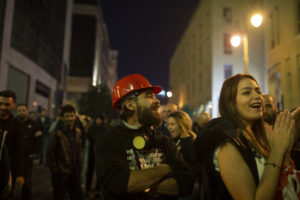

You need to be a supporter to comment.
There are currently no responses to this article.
Be the first to respond.